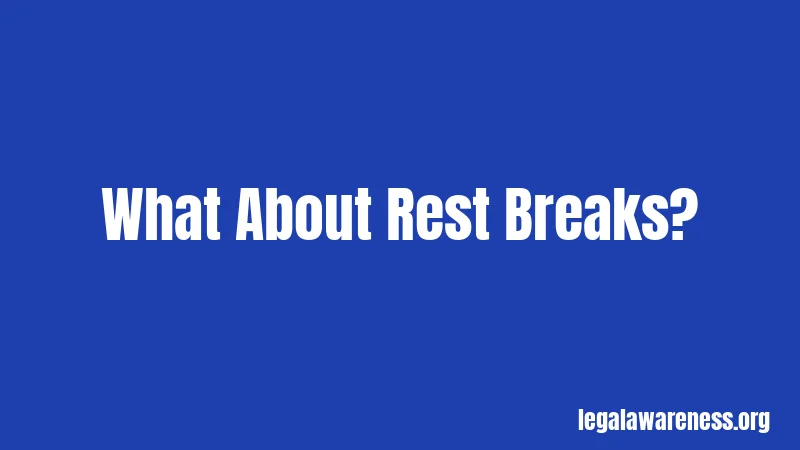Indiana Lunch Break Laws (2026): Here’s What Actually Applies to You
Okay, so you work in Indiana. You’re probably wondering: does my employer have to give me a lunch break? Good question. Honestly, this one surprises most people because the answer isn’t what they expect.
Here’s the thing. Indiana doesn’t have state laws requiring employers to give you a lunch break. Yep, you read that right. No state-level break requirement. But wait—that doesn’t mean you’re completely out of luck. Federal laws and specific situations change the game.
What Is a Lunch Break, Anyway?

Let’s start simple. A lunch break is time off during your workday when you can eat, rest, or do your own thing. It’s unpaid time in most cases. You’re not working. Your boss isn’t paying you. You just get to step away.
Think of it like this. You work 8 hours a day. Your boss gives you 1 hour to eat lunch and chill. That 1 hour doesn’t count toward your pay. So simple, right? But the rules about whether they have to give it to you? That’s where Indiana gets interesting.
The Big Truth About Indiana Lunch Break Laws
Here’s where it gets interesting. Indiana has basically no state law requiring meal breaks. That’s the official word from the Indiana Department of Labor. Your employer isn’t legally required to give you lunch at all. Not even 15 minutes.
Wait, before you panic. Keep reading. This isn’t the whole story. Not even close.
Federal Law Steps In (When It Applies)

So Indiana doesn’t require breaks. But the federal government does—kind of. Here’s how it works.
The Fair Labor Standards Act (FLSA) is a federal law. It says breaks under 20 minutes must be paid time. If your boss gives you a 15-minute break, you get paid for those 15 minutes. They count as work time.
But here’s the catch. If your break is 30 minutes or longer, it can be unpaid. Your employer can say “take 30 minutes for lunch, unpaid.” That’s legal under federal law. Makes sense, right?
The FLSA doesn’t require breaks at all though. It just says if you get a short break, it’s paid. Indiana uses this federal standard since there’s no state law to override it.
When Your Employer DOES Have to Give Breaks
Not sure what counts as a violation? Let me clarify. There are situations where Indiana employers absolutely must give breaks.
Nursing Mothers: This one’s important. If you’re breastfeeding or pumping at work, federal law protects you. The FLSA requires employers to give you break time to pump. It has to be unpaid time (unless your company policy says otherwise). This applies to companies with 50 or more employees. You also need a private space. A bathroom doesn’t count. It needs to be a real room.
Young Workers: If you’re under 18, different rules apply. Federal child labor laws set break requirements for teen workers. These are stricter than rules for adults. Your employer must follow these rules even though Indiana doesn’t have a state law.
Union Employees: Think you’re in a union? Check your contract. Union agreements often include specific break requirements. Your employer must follow what the contract says.
What About Rest Breaks?

Okay, pause. This part gets tricky. Some people confuse meal breaks with rest breaks. They’re different things.
A meal break is longer. Usually 30 minutes or an hour. You eat lunch. It’s unpaid. A rest break is shorter. Think 5 or 10 minutes. You grab water, use the bathroom, stretch. These are usually paid.
Here’s where it gets interesting. Federal law doesn’t specifically require rest breaks either. But many employers give them anyway. Why? Because it’s good practice and keeps employees happy. But Indiana doesn’t legally require them.
Some industries do have specific requirements. Manufacturing plants sometimes have rules. Government agencies have policies. But these come from industry standards or company policy, not Indiana law.
Penalties for Breaking the Rules
Okay, so what happens if your employer messes up? Let’s talk consequences.
If your employer violates federal law (the FLSA), you can file a complaint. The Department of Labor investigates. If they find a violation, your employer has to pay you back. You get the wages you should have gotten. Plus, sometimes damages on top of that.
In Indiana, if your company is unionized and breaks the contract? You can file a grievance. The union helps you. This can lead to back pay and other compensation.
Honestly, this is the part most people miss. You have options. You’re not stuck just accepting it.
Special Circumstances in Indiana
Let’s talk about situations that are a little different.
Exempt Employees: If you’re salaried and considered exempt under the FLSA, different rules apply. You might not be eligible for paid breaks. But your employer still can’t make you work through lunch without some agreement. This gets complicated, honestly. If you’re unsure, ask HR or a lawyer.
Minors and Teen Workers: Federal law is pretty clear here. If you’re under 18, break requirements are stricter. Most states (including Indiana when federal law applies) require breaks for young workers. Employers must give you time to rest and eat. These breaks should be reasonable and come at appropriate times during your shift.
Agricultural Workers: Farm workers have different rules in many cases. Federal law has specific provisions. Indiana agriculture often follows federal standards.
What You Should Actually Do
Stay with me here. This is practical stuff you can use.
First, check your employee handbook. Your company probably has a break policy. It might be better than what the law requires. Many Indiana employers give breaks even though they’re not legally required to. That’s actually pretty common.
Second, ask your manager or HR department. Yes, really. Ask them directly. When are break times? Are they paid or unpaid? What’s the policy? Getting this in writing is smart. You’ll have proof.
Third, keep track. Write down when you take breaks. Note how long they are. Save any communications about breaks. If something goes wrong later, you’ll have evidence.
Fourth, if something seems wrong, don’t just ignore it. You have options. You can file a complaint with the Department of Labor. You can talk to a lawyer. You can reach out to your state representative. Don’t assume you’re stuck.
How to Report a Violation
Wondering how to actually report something if it happens? Here’s how.
You can file a wage and hour complaint with the U.S. Department of Labor. Go to their website. Fill out a complaint form. They investigate for free. You don’t need a lawyer (though having one helps).
Indiana also has a Department of Labor. You can file complaints there too. They handle state-level issues and can point you toward federal resources.
Keep documentation. Screenshots of schedules. Text messages. Emails. Write down dates when breaks weren’t given. The more specific you are, the stronger your case.
Frequently Asked Questions
Does Indiana require employers to give lunch breaks? No. Indiana has no state law requiring meal breaks. However, federal law requires that breaks under 20 minutes must be paid time.
If my boss makes me work through lunch, do I get paid extra? If you work through your meal break without approval, you should be paid for that time. That’s federal law. Document it and report it.
Can my employer make me take lunch without pay? Yes, for breaks 30 minutes or longer. Employers can make unpaid meal breaks. But they can’t make you work through it unpaid. That’s illegal.
Are there any Indiana-specific break laws I should know about? No specific meal break laws. But if you’re under 18, federal child labor laws apply. Nursing mothers are protected too.
What if my company is too small—do different rules apply? The FLSA applies to all employers with some exceptions. Size doesn’t usually matter for break rules, though some protections apply only to larger companies.
Final Thoughts
Alright, here’s the bottom line. Indiana doesn’t require lunch breaks. That’s the reality. But that doesn’t mean you have no protections. Federal law steps in for short breaks, young workers, and nursing mothers.
Most Indiana employers give breaks anyway. It’s good business. It keeps people happy and productive. If yours doesn’t, you still have options. You can speak up. You can file a complaint. You’re not helpless.
The key? Know your rights. Ask questions. Keep records. And if something doesn’t feel right, look into it. Don’t just accept it and move on. Your time matters. Your pay matters. Make sure you’re treated fairly.
When in doubt, reach out to the Department of Labor or talk to an employment lawyer. It’s your career. Protect it.
